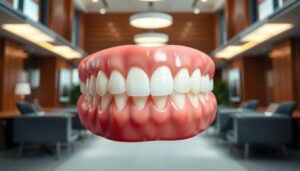Gum health is key to our overall well-being, but it’s often ignored. In just two weeks, you can boost your gum health with simple tips. This article will show you how to improve your gums fast, including good hygiene, a healthy diet, and lifestyle changes.
Knowing why gum health matters is important. It’s linked to many health issues. By using these tips, you can see big improvements in your gum health. These changes will also help your overall health for the long term.
Understanding Gum Health
Healthy gums are key to good oral hygiene. They surround the teeth and play a big role in dental health. If gums are firm and pink, and don’t bleed when brushing or flossing, they’re healthy.
Keeping gums healthy is important. It helps prevent disease and keeps your smile looking good.
What is Gum Health?
Gum health is about the condition of the tissues around the teeth. These tissues support the teeth and fight off harmful bacteria. Healthy gums act as a shield, stopping infections that could harm your teeth.
It’s important to check your gum health daily. Using good gum health tips can help keep your gums in top shape.
Why Gum Health Matters
Healthy gums are more than just a pretty smile. Research shows a link between gum disease and serious health issues like heart disease and diabetes. If you ignore your gum health, you might face higher risks of these problems.
Regular gum health checks are vital. They help catch and prevent big problems early. Taking care of your gums can greatly improve your overall health.
Signs of Gum Disease
Knowing the signs of gum disease is key to good oral health. Spotting symptoms early helps prevent gum disease. It’s important to watch for signs that your gums might be unhealthy.
Common Symptoms to Watch For
Looking out for common symptoms can help catch gum disease early. Key signs include:
- Swollen or inflamed gums
- Red or tender gums
- Bleeding during brushing or flossing
- Persistent bad breath
- Gum recession or pulling away from teeth
- Loose or shifting teeth
If you notice any of these signs, act fast. Good oral care can help treat gum disease successfully.
When to See a Dentist
Knowing when to see a dentist is crucial for gum disease. See a dentist right away if you experience:
- Severe pain in the gums
- Noticing significant gum recession
- Changes in tooth positioning
Regular dental visits are important for your oral health. They help prevent gum disease. Early treatment keeps your gums healthy for a long time.
Essential Oral Hygiene Practices
Keeping gums healthy is key to good oral health. Good oral hygiene is crucial for this. By following the best gum care practices, you can improve your gum health and avoid diseases.
Brushing Techniques for Healthier Gums
When brushing, pay attention to the angle and how long you brush. Use a soft-bristled toothbrush, as it’s gentle yet effective. Brush at a 45-degree angle against your gum line.
This helps remove plaque from both teeth and gums. Brush for at least two minutes, twice a day. Also, change your toothbrush every three to four months for better oral hygiene.
The Importance of Flossing Daily
Flossing is vital and goes hand in hand with brushing. It gets rid of food and plaque in tight spaces between teeth. Daily flossing cuts down the risk of gum disease.
Use the right technique—gently push the floss between each tooth. This way, you get the most out of flossing without hurting your gums. Combining flossing with brushing is a solid oral hygiene routine.
The Role of Diet in Gum Health
Eating right is key to keeping your gums healthy. Knowing which nutrients for strong gums helps you choose better foods. A mix of vitamins, minerals, and avoiding certain foods can boost gum health.
Nutrients That Strengthen Gums
Vitamins and minerals are vital for gum health. They include:
- Vitamin C: Essential for collagen and healing.
- Calcium: Keeps bones strong and teeth in place.
- Magnesium: Works with calcium for better gums.
- Omega-3 fatty acids: Good for fighting inflammation.
Adding these nutrients to your diet for gum health is a great start for better oral care.
Foods to Avoid for Better Gum Health
Some foods can hurt your gums. It’s best to cut down on:
- Sugary foods: Cause plaque and gum disease risk.
- Acidic foods: Harm enamel and irritate gums.
- Processed snacks: Full of sugar, low in good stuff.
Reducing these foods to avoid for better gum health helps towards healthier gums.
Importance of Hydration
Keeping your body hydrated is key for good oral health, especially for your gums. Water helps your mouth work right, getting rid of food bits and germs. This lowers the chance of gum disease. Drinking enough water keeps your mouth moist and clean.
How Water Affects Gum Health
Water keeps saliva levels balanced, which fights off acid from bacteria. Saliva also strengthens teeth by making them less prone to decay. A hydrated mouth reduces gum inflammation and helps them heal. This is crucial in stopping gum disease.
Tips for Staying Hydrated
- Incorporate water-rich foods such as cucumbers and watermelon into your diet.
- Establish a routine for regular water intake throughout the day.
- Set reminders on your phone to drink water at regular intervals.
- Replace sugary beverages with water to improve overall hydration.
- Carry a reusable water bottle to make access easier and encourage higher water consumption.
Using Mouthwash Effectively
Using mouthwash right can really help your gums. It’s important to pick the right one. The right mouthwash can keep your mouth clean and prevent gum disease.
Choosing the Right Mouthwash
Look for mouthwash that fights gum problems. Antimicrobial mouthwashes kill bad bacteria. Fluoride mouthwashes help strengthen teeth and fight plaque.
Always read the label to make sure it’s good for your gums.
How Mouthwash Benefits Gum Health
Mouthwash does more than just freshen your breath. It helps reduce plaque and gum inflammation. It works well with brushing and flossing to improve your oral care.
For the best results, follow the instructions on how often and when to use it.
Professional Dental Care
Regular dental care is key to keeping gums healthy and preventing disease. Visiting a dentist early can catch problems before they get worse. This helps keep your gums and teeth in top shape.
Regular Visits to the Dentist
Going to the dentist regularly is important for your mouth’s health. Try to see your dentist at least twice a year. They check your gums and can spot gum disease early.
This early detection helps prevent bigger issues later on.
Deep Cleaning as a Treatment Option
If you have severe gum disease, deep cleaning is needed. This treatment, like scaling and root planing, gets rid of plaque and tartar below the gum line. It’s a detailed process that reduces inflammation and makes gums healthier.
Knowing how important this treatment is helps you see the value of dental care for your health.
Home Remedies for Gum Health
Looking into home remedies for gums can help you improve your oral care. Natural ingredients and small changes in your lifestyle can greatly benefit your gum health and overall well-being.
Natural Ingredients to Try
Adding certain natural remedies to your daily routine can be beneficial. Some effective ingredients include:
- Tea tree oil: It has antibacterial properties that help reduce inflammation and promote healthier gums.
- Aloe vera: Its soothing nature helps in healing and reducing gum irritation.
- Saltwater rinses: A simple mix can help by reducing bacteria and inflammation.
Lifestyle Changes to Consider
Making certain lifestyle changes can greatly improve your gum health. Some suggestions include:
- Reduce sugary snacks and drinks to prevent gum disease.
- Stay active to improve circulation, which benefits gum health.
- Brush and floss daily for effective gum care.
Stress Management and Gum Health
It’s important to understand how stress affects our gums. Stress can cause us to grind our teeth and forget to brush our teeth. This can harm our gum health. So, managing stress is crucial for keeping our gums healthy.
How Stress Impacts Oral Health
Stress can harm our oral health in many ways. It can cause more plaque, inflammation, and sensitivity in our gums. These issues can lead to gum disease. So, we need to see stress as a big part of taking care of our mouths.
Techniques for Reducing Stress
There are many ways to reduce stress and keep our gums healthy. Here are some effective methods:
- Mindfulness Meditation: Mindfulness helps calm our minds and lowers stress.
- Regular Exercise: Exercise boosts our mood and reduces anxiety and stress.
- Time Management: Organizing our day helps us manage stress better.
- Relaxation Techniques: Deep breathing and yoga help us relax and reduce tension.
The Role of Smoking in Gum Health
Smoking harms gum health by affecting blood flow and healing. Studies show it increases gum disease risk. It also causes long-lasting inflammation and slow healing from injuries. Knowing these effects is key for keeping gums healthy.
How Tobacco Affects Gums
Tobacco use harms gums in several ways. It limits blood flow, making gums more prone to infection. Cigarettes’ chemicals also weaken the immune system, making it harder to fight mouth infections. Smokers often see their gums recede, exposing tooth roots and raising tooth loss risk. Regular dental visits are crucial for monitoring and care.
Strategies for Quitting Smoking
For better gum health, quitting smoking is essential. Effective strategies include:
- Seeking professional help from healthcare providers.
- Joining support groups for community and accountability.
- Using cessation aids like nicotine patches or medications.
- Practicing mindfulness to manage withdrawal symptoms.
Combining these strategies with gum health efforts can reduce smoking’s harm. This leads to healthier gums.
Tracking Your Progress
It’s key to keep an eye on your gum health to stay on top of your oral hygiene. Writing down your gum health journey helps you track symptoms and how you react to different treatments. This journal becomes a guide for making better choices in your gum care routine.
Keeping a Journal of Your Gum Health Journey
Writing down your habits and their impact on your teeth is enlightening. By regularly checking your gum health, you can spot patterns in your diet and hygiene. This helps you see when things get better or when new issues pop up. It’s a powerful tool for managing your gum health on your own.
When to Adjust Your Routine
Looking back at your journal can show when it’s time to change your gum care routine. Signs like more sensitivity, bleeding gums, or diet changes might mean it’s time for a new approach. By making smart changes based on your journal, you can improve your gum health. Regularly checking and adjusting your routine helps keep your gums healthy for the long haul.




